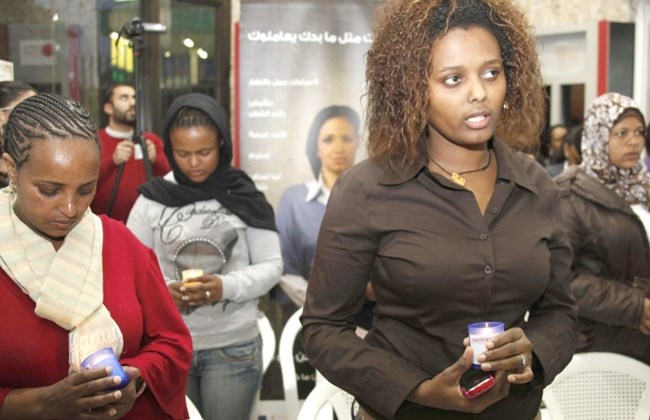
Ethiopian women hold a mass in memory of Alem Dechasa in Beirut, March 21, 2012
March 30 is International Domestic Workers’ Day. Around the world domestic workers, overwhelmingly women, work to clean households, cook, mend, care for children, for elders, for the sick, for those with disabilities. Around the world, domestic workers, millions upon millions of women and girls, travel to or wake up in other peoples’ homes and take care of their employers’ emotional well-being. Around the world, domestic workers organize and struggle with denial of payment, denial of social security, unpaid extended workdays, mistreatment, exploitation, abuse. So, when Ai-Jen Poo, of the National Domestic Workers Alliance, wishes her sisters happy international domestic workers’ day, the wish is as aspirational as it is of the present moment. It’s as hopeful as it is courageous.
Alem Dechasa-Desisa’s life story demonstrates that all too well. On March 8, a video started circulating. The video showed a young Ethiopian woman, presumed to be a domestic worker, pleading for help outside the Ethiopian Embassy in Beirut, Lebanon. A car pulls out. Men jump out, attack the young woman, kick her, knock her to the ground, and worse, and then force her into the car and disappear. All this was caught on video and then shown on Lebanese television news.
Later it was reported that the young woman was indeed an Ethiopian domestic worker, Alem Dechasa-Desisa, 33 years old. She was from Addis. She was the mother of two children. She arrived in Beirut in December 2011, less than three months earlier.
Dechasa-Desisa was suffering. According to her employer, she was suffering a nervous breakdown. Many in Lebanon doubt that was the case. Her employer dumped her at the Embassy, who did nothing. Worse, the Embassy told the employer to take Dechasa-Desisa to a mental health hospital. Take her anywhere. Take her away.
When the police found the young Ethiopian woman, they took her to the immigrant detention center, with the intention of deporting her. She cried so much she was taken … to a mental health hospital. Two days later, she was dead, by hanging. Suicide. Structural homicide. Alem Dechasa-Desisa was dead.
The video shocked Lebanon. The video shocked Ethiopia as well. The death of Alem Dechasa-Desisa disturbed Europe as well, and received some mention in the United States. But what exactly is the shock, the scandal?
The abuse of domestic workers is systemic. The abuse of transnational, migrant workers is, if possible, even more systemic. This new form of a very old situation is intensified by nationalism, racism, sexism. It is also intensified by the structurally induced greater vulnerability of the transnational migrant domestic worker. More often than not, she is a live-in worker. Her `home’ is her employer’s home. Live-in for a transnational migrant worker means more than being on-call 24 hours a day, although that would be bad enough. It means the worker is homeless. If she’s kicked out … there’s no place to go. If she leaves, there’s no place to go. Her very being on the street becomes a criminal act.
All domestic workers struggle with exploitation and abuse. All domestic worker struggle with the absence of any real possible response to exploitation and abuse, other than personal resistance. They know that no State will aid them. Quite to the contrary.
For transnational domestic workers, it’s worse.
The vulnerability of the transnational domestic worker is intensified by the reliance of the home country on the money earned and sent home by the workers who have traveled to richer countries. The home countries also rely, heavily, on the absence of those workers, the reducing of pressures to employ them. The home country needs its workers in other countries and it needs them `to behave’.
The Ethiopian Embassy responded to Alem Dechasa-Desisa’s pleas. It closed its doors.
Alem Dechasa-Desisa’s story is the story of young women on the move, around the world. Hers is the story of modern labor, young women workers struggling to make a living. Without strong unions, women domestic workers are left to their own devices. Without strong unions, women domestic workers’ stories only come to the surface when someone is abused in public and caught on video. Without strong unions, women domestic workers’ lives are defined, by the public, by `suicide.’
Women domestic workers define their own lives differently. Hard work. Advancement. Struggle. Shared laughter and tears.
Yesterday, Friday, March 30, 2012, was International Domestic Workers’ Day. Remember and recognize Alem Dechasa-Desisa and her sisters. Honor them as builders, as the women who have built the everyday lives of the entire planet, and support their organizing efforts. Happy International Domestic Workers’ World!
(Photo Credit: Daily Star)